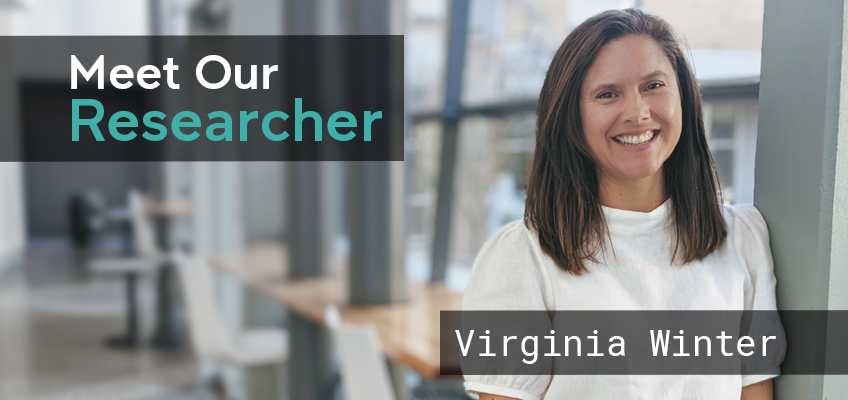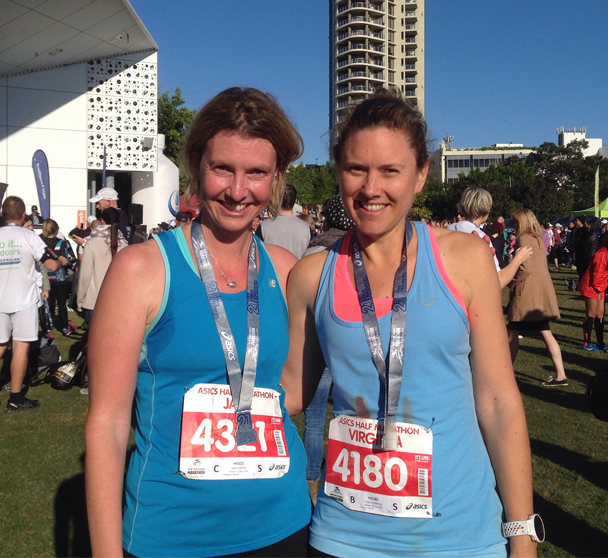10 Sep 2020

With the world’s ageing population increasingly affected by dementia, CHeBA’s Sydney Memory and Ageing Study offers a rich dataset to explore the nature of dementia and predictors of cognitive decline to mediate the impact of the disease. With over 1,000 participants involved in the study, Research Assistant Virginia Winter can attest to how fascinating and valuable CHeBA’s study participants are. She notes that the generous ongoing donation of their time to research, to support future generations, is inspiring.
How did you get into researching the ageing brain?
While completing my clinical training in neuropsychology, I was fortunate to have the opportunity to work as a Research Assistant within the University of New South Wales’ School of Psychiatry, which is what set me off on a career in research. After graduating, I moved several times between Sydney and London, following a passion for travel and being open to interesting research opportunities that presented themselves along the way.
I enjoyed the research process and found fulfillment in the broad contribution and impact that research can have on creating change and improving lives.
I worked across various fields in social and psychological research, mostly in younger populations. It was not until I took up an opportunity to work on clinical trials for dementia at Charing Cross Hospital in London that I realised this was a field I wanted to pursue.
Did you experience a ‘defining moment’ which led you to this field?
No, there was no defining moment. In my role at Charing Cross Hospital I worked closely with the participants and their families and carers and I came closer to witnessing the devastating impact dementia has on so many lives. At times, I confess I found this distressing, there were several participants whose journeys had a profound personal effect on me and who I often still think about to this day. At the same time, I was inspired by their determination and commitment to combatting the disease, as well as motivated by the passion of the researchers I was working with in determining ways to reduce its impact. This coincided with my growing awareness of the enormous public health implications of dementia at the population level, which ultimately drove my desire to contribute to the field.

Do you have any personal interests or activities which are protective behaviours against cognitive decline?
I have always been very keen on staying physically healthy. I do a lot of running and have completed several marathons while on my travels around the world. Between my young family and work, I no longer have so much time for those long runs but I always make sure that I maintain a good level of fitness. It is both mentally and physically important for me. I try to combine running with some pilates as I realise how important it is to maintain my strength as I get older. I also eat a healthy and mostly plant-based diet; I don’t drink too much and I stay socially connected with my friends and family. Since the COVID-19 restrictions, we have adopted a 5-year-old whippet. She has inspired our family to get outside and exercise more together – although none of us have got close to out-running her!
What are you currently researching?
The Sydney Memory and Ageing Study is a longitudinal study which aims to determine the predictors of healthy ageing and cognitive decline. It is one of the largest and longest-running studies of its kind in Australia and I feel honoured to be part of this important phase of the research which is currently in its 12th year of follow up. At the beginning of the study, there were just over 1000 participants involved. We are still following up around 300 of those participants today and I find it inspiring that so many people have been willing to dedicate so much of their time and energy to be involved in the project over many years. In my Research Assistant role, I conduct neuropsychological and general health assessments with our participants and interviews with their families, friends and carers. With the current restrictions in place due to COVID-19, our work with participants has changed dramatically. We are no longer able to do face-to-face interviews and have had to pivot to conducting our research over the phone. This has provided some interesting challenges, but the team and our participants have adapted well to the changing circumstances.
Why is your research important?
We have a rapidly ageing population and as such dementia has become a huge issue for our whole society. The large scale of the Sydney Memory and Ageing Study offers really rich data that can help us understand the rates, nature and predictors of cognitive decline as we get older. This, in turn, can inform the development of assessment tools, interventions and preventative strategies.
I am particularly interested in modifiable risk factors, which are those factors that we can control by making changes to our lifestyles or behaviours.
Currently, there is no cure for dementia and we do not have readily available, effective pharmacological treatments for the condition, so it is really important that we know as much as possible about potential modifiable risk factors so we can do more to reduce our risk of getting dementia - or delay its onset. It is only by doing this kind of research that we are able to identify and, subsequently, promote valid lifestyle and behavioural changes.
What do you love about working for CHeBA?
A large amount of my time is spent with participants and speaking to their family, friends and carers. It is a privilege to be able to listen to each of their unique life stories and experiences and their attitudes towards ageing. It has really changed my own perspectives on ageing. Beyond that, the team of MAS researchers and the CHeBA team as a whole is really supportive and collaborative and this has been especially evident during the challenges that we have faced together this year. There is a real sense that everyone is working together towards a common goal.
What is the ultimate hope you have for your research?
I hope that we are able to provide empirical support for a range of modifiable risk factors for cognitive decline and dementia. Ultimately, I hope our research helps to promote better cognitive ageing to reduce the burden of disease at the population level, and to improve individuals’ quality of life across the lifespan.
This interview was undertaken during the COVID-19 self-isolation period. Virginia Winter found that having video calls with her family and friends and running along the Cooks River supported her mental resilience and kept her feeling socially connected while physically isolated.
Donations are fundamental for critical research to continue following COVID-19.
If you would like to discuss supporting Virgina's work specifically, or would like information
on leaving a legacy via a Gift in your Will, please contact h.douglass@unsw.edu.au.

Virginia Winter is a Research Assistant at CHeBA with the Sydney Memory and Ageing Study, which aims to investigate predictors of cognitive decline in older adults. She obtained a Bachelor of Arts with Honours in Psychology from the University of Sydney and a Masters of Clinical Neuropsychology at Macquarie University. Prior to working at CHeBA, Virginia worked as a psychologist focusing on clinical trials in Alzheimer’s disease and Mild Cognitive Impairment at Charing Cross Hospital in London. Her broader research interests include quality of life after brain injury, neurodegenerative conditions and predictors of successful ageing.
